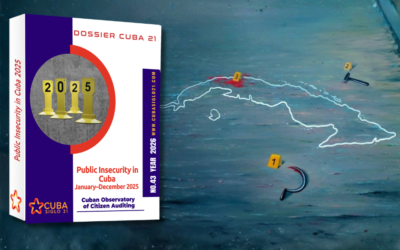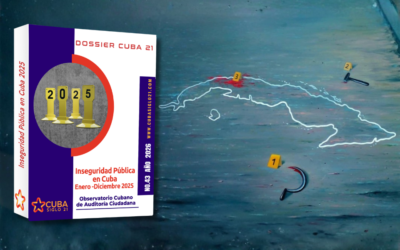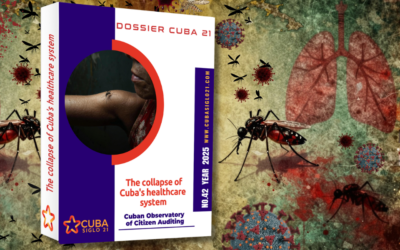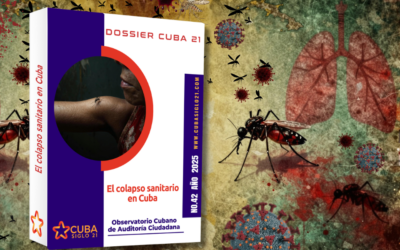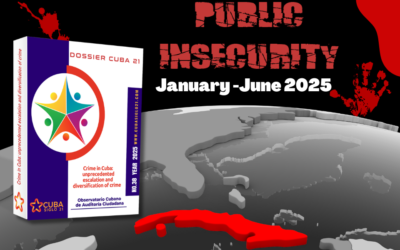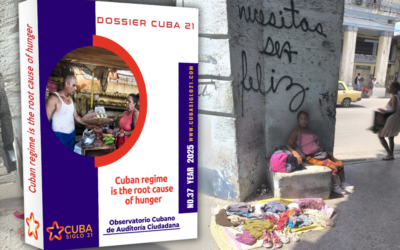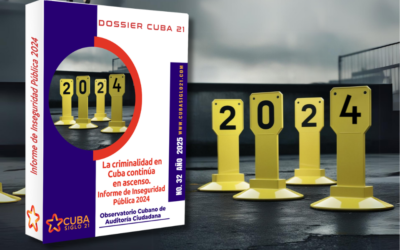The study by the Cuban Observatory of Citizen Auditing (OCAC) identifies a 115.11% increase in criminal activity in 2025 compared to 2024, and a 336.58% increase compared to 2023

Informe de Inseguridad Pública 2025
El estudio del Observatorio Cubano de Auditoría Ciudadana (OCAC) identifica un incremento del 115,11 % de la criminalidad en 2025 respecto a 2024 y un aumento del 336,58 % en comparación con 2023.
The collapse of Cuba’s healthcare system
The Cuban government is lying about the extent of the healthcare collapse in Cuba. The death toll would reach at least 8,700 fatalities. This shows that the state has lied again (as it did with the Covid epidemic) by claiming that only 47 deaths had occurred by mid-December. The reality is, at a minimum, 185 times greater.
El colapso sanitario en Cuba
El gobierno cubano miente acerca de la magnitud del colapso sanitario en Cuba. La cifra de defunciones alcanzaría como mínimo 8,700 fallecidos. so muestra que el estado ha mentido nuevamente (ya lo hizo con la epidemia de Covid) al afirmar que solo han ocurrido 47 defunciones hasta mediados de diciembre. La realidad sería, como mínimo, 185 veces mayor.
Crime in Cuba: unprecedented escalation and diversification of crime
The Cuban Observatory of Citizen Auditing (OCAC) documented 1,319 verified crimes between January and June 2025, almost five times more than in the same period in 2023 and more than all that happened throughout 2024. This represents an average of 7.3 crimes per day, evidencing an unprecedented escalation in crime and a diversification of criminal types.
Criminalidad en Cuba: escalada sin precedentes y diversificación delictiva
El Observatorio Cubano de Auditoría Ciudadana (OCAC) documentó 1,319 delitos verificados entre enero y junio de 2025, casi cinco veces más que en igual periodo en 2023 y más que en todo 2024. Esto significa un promedio de 7,3 delitos diarios, evidenciando una escalada delictiva sin precedentes y una diversificación de tipologías criminales. Los datos desmienten declaraciones oficiales.
Cuban Regime is the Root Cause of Hunger
To feed a Cuban with the basics, at least 30,000 pesos per month are needed. This explains why most Cubans can barely manage two meals a day and, in many cases, cannot even include protein in their diet. One Cuban Pesos equals 0.04 cents of US Dollars.
Sin campo no hay país y con GAESA no hay futuro
Para alimentar con lo básico a un cubano se necesitan al menos 30,000 pesos al mes. Esto explica por qué la mayoría de los cubanos apenas logra consumir dos comidas al día y, en muchos casos, ni siquiera pueden incluir proteínas en su dieta.
Crime in Cuba continues to rise. Public Insecurity Report 2024
While the government tries to minimize the importance of the amount of crimes committed, the fact is that criminal acts continue to increase, an increase of 50.72% in comparison to 2023.
La criminalidad en Cuba continúa en ascenso Informe de Inseguridad Pública 2024
Mientras el gobierno cubano intenta minimizar la importancia de su cuantía, el hecho es que los actos delictivos continúan en aumento, un incremento en 2024 del 50.72% en relacion a 2023.

